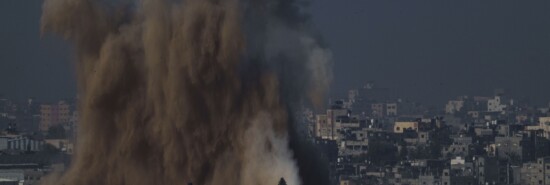
Israel war: US should support these expanded humanitarian efforts, not a ceasefire
Tom Rogan
Video Embed
With thousands of Palestinian civilians now dead amid the intense fighting in the Gaza Strip, some suggest a ceasefire between Israel and Hamas is necessary.
True, Israel could now end its war effort and retain short- or medium-term security versus the terrorist group. Israel’s problem is that allowing Hamas to retain its scaled military threat would allow it to perform future atrocities. Following the Oct. 7 atrocity, this would be unacceptable to the Israeli people and government. Yet the more important concern is that, in allowing Hamas to retain its scaled threat, Israel would utterly desecrate its deterrent credibility in the Middle East. The rising specter of a nuclear-armed Iran makes that an impossible choice for Israel. It would be tantamount to opening the door to a second Holocaust.
BIDEN RISKS ENCOURAGING IRANIAN TERRORIST ATTACKS
At the same time, Hamas’s total destruction may well be impossible. Terrorist groups cannot be entirely defeated if they retain a measure of ideological and popular support. Still, Israel can greatly degrade Hamas’s military capabilities and political infrastructure. In return for Israel’s suspension of high-tech engagement with China, something that unacceptably risks American service personnel’s lives, the U.S. should support a sustained Israeli campaign to render Hamas a shadow of its former power.
That said, U.S. support for Israel is straining Washington’s relations with top allies such as Jordan and Saudi Arabia. Both Amman and Riyadh matter greatly to U.S. national security. The heavy use of Israeli airstrikes to target Hamas and support Israeli ground forces is causing significant civilian casualties. As casualties continue to mount, the risks of an intervention by Iran and/or the Lebanese Hezbollah will grow. That may require U.S. military action to defend Israel’s northern border or target Iranian ballistic missile forces. Also problematic: Washington is encouraging Iranian escalation by tolerating Tehran’s escalating attacks on U.S. military forces.
In turn, there is a compelling intersection of political, humanitarian, and security concerns to justify expanded humanitarian relief for Gazan civilians. But how can this be accomplished without unduly damaging Israel’s war effort?
CLICK HERE TO READ MORE FROM THE WASHINGTON EXAMINER
The continuation of Jordanian air drops and the formation of international safe zones in Gaza would be positive developments. Expanded Israeli humanitarian corridors that allow Gazan civilians to evacuate areas of intense combat are also preferable. And as advances are made, we should hope Israel puts a greater emphasis on ground operations over airstrikes. These steps would provide meaningful relief for civilians while avoiding the damage that prolonged combat pauses would do to Israel’s war effort. While a short combat pause in return for the release of dozens of hostages may be worthy of support, a ceasefire would only allow Hamas to regroup and rest toward better targeting Israeli forces.
The best path forward, then, should be clear: a continuation of Israel’s war effort, alongside expanded humanitarian provisions.
